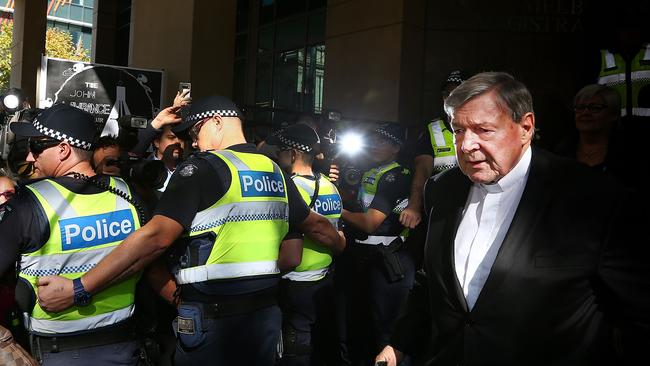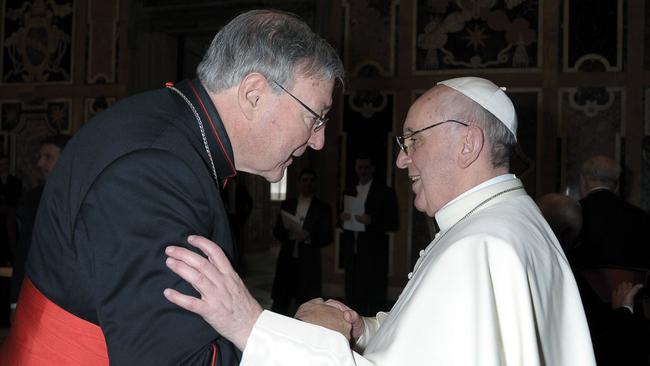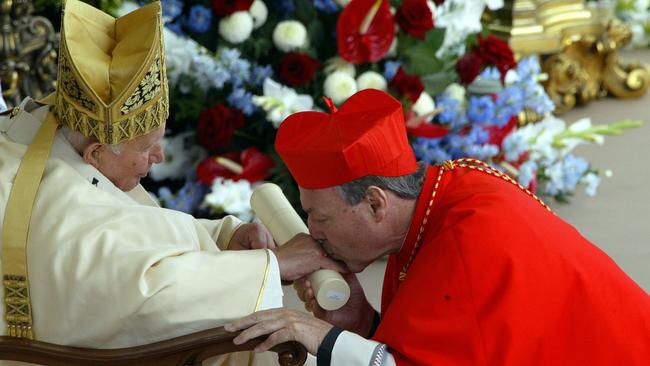George Pell: the trial of the century
The hearing in courtroom No 1 will be remembered in Catholic history as the location of George Pell’s second last stand.

The hearing in courtroom No 1 will be remembered in Catholic history as the location of George Pell’s second last stand.
Magistrate Belinda Wallington, weighed by the gravity of the moment, appeared to look briefly down the barrel of Pell’s eyes before asking how he would plead.
Pell stared blankly before thundering: “NOT GUILTY.”
It was a decidedly Pell-like act of defiance and maybe even confidence that briefly concealed the look of absolute dejection that followed, with a date booked across the road at the County Court for a directions hearing today.
Half the charges, including the most serious, were dropped.
The committal of some allegations to the higher court was not altogether unexpected because of the nature of the legal process and the magistrate’s belief that the remaining claims should be tested by a jury.
The committal makes no judgment of his guilt or innocence but puts him for the first time in front of one or more juries.
It also triggers the trial of the century, with not only Pell but the entire criminal justice system under scrutiny, from the police force up, as the cardinal’s defence team tries to tear apart the remaining charges of historical sex offences involving multiple complainants.
Pell’s lawyer Robert Richter QC was eager to make the point during legal debate at the end of Wallington’s judgment yesterday that the most serious of the charges had now disappeared.
But it was in his closing comments during the committal hearing that Richter best summarised the Pell team’s position.
“We say that Cardinal Pell, representing the face of the Catholic Church, a prominent person, had been the obvious target of allegations that are not true but are designed to punish him, almost, for not having prevented sexual abuse for many years,” he said.
Of the most serious charges, he said: “Their complaints ought to be regarded as impossible and ought to be discharged without batting an eyelid.”
On some levels Wallington agreed, yesterday throwing out the most serious allegations, including the charge that Pell had offended during the screening of the 1970s science fiction movie Close Encounters of the Third Kind, at a playground and in a chapel.
“The most serious offending alleged could not have occurred in the timeframe alleged,” Wallington determined.
“I find that the evidence as a whole is not of sufficient weight for a jury to convict.”
She also savaged as cavalier the evidence of another witness who claimed wrongdoing at a swimming pool.
“It is difficult to see how a jury can convict on the evidence of a man who said he can’t recall what he said a minute ago,” she said.
But after dismissing a series of charges against the cardinal, Wallington committed the 76-year-old to stand trial on allegations involving claims of sexual offending at a swimming pool in the 1970s in country Victoria while playing games.
He also is accused of offending against choristers at St Patrick’s Cathedral after he was elevated to the position of archbishop of Melbourne.
The magistrates court sat publicly for 14 days, hearing evidence from at least 41 witnesses; and others — including complainants — appearing by video from a remote location also were cross-examined at length.
The in-camera evidence means the world has not heard a fundamental aspect of the case: the voices of the people alleging that they had been assaulted by the now cardinal.
Instead, it largely has been the defence’s story and interrogations that have dominated court time.
Pell’s team yesterday consisted of Richter; prominent Melbourne lawyer Paul Galbally; Pell’s adviser Katrina Lee; his friend, prominent Sydney Catholic Chris Meney; and Monsignor Charles Portelli, the man who ran St Patrick’s Cathedral in Melbourne under Pell.
In some cases the allegations relate to Pell as a relatively junior priest, yet to climb the extraordinary heights that led him to the Vatican and to become — notionally — the world’s third most powerful Catholic.
During the committal, the court heard allegations from the 1970s to the mid-90s, and much of the claims related to country Victoria. But there also was extensive cross-examination on whether Pell could possibly have offended while archbishop of Melbourne.
A forensic debate followed about the inner workings of St Patrick’s Cathedral in Melbourne, the role of the choir, drilling into the detail of whether the altar wine was white or red and whether a man wearing multiple layers of vestments weighing up to 3kg each could offend while in such a public place.
In the process of the committal hearing, it emerged other key charges were dropped, an alleged victim died before the proceedings began and a second withdrew from the proceedings because of medical issues. This resulted in fewer charges.

The cathedral
During the committal hearing the court heard extensive evidence on St Patrick’s in Melbourne, which was under Pell’s effective control in the 90s. The cathedral, a significant example of gothic revival architecture, is at the heart of church life and has never been so scandalised.
Pell was accused of offending against members of the choir and one of the alleged victims is now dead.
Questions were raised about whether Pell was ever left alone in the cathedral, with Portelli declaring: ‘‘It was not possible for him to be alone at a Sunday mass, simply impossible.’’
Portelli attended court yesterday and Pell was given permission to speak to the potential witness ahead of the trial.
Much of the committal hearing focused on whether Pell could have had the opportunity to offend, a point raised yesterday by Wallington.
Former chorister Rodney Dearing agreed Pell was shadowed by a church official when robed but the magistrate questioned during the committal whether the defence’s position on the multiple layers of church garments was strong.
Wallington said: “I don’t think the robes are your strongest point.”
Richter said that the cardinal wore pants under three layers of garments, declaring: “There’s a strong point. It’s all made up.”
The court heard that Pell probably could have presided over only two masses the year he became archbishop and there was extensive questioning about whether choristers could have broken away from the large procession at any solemn mass.
The offending is alleged to have occurred at the back of the church, including the sacristy.
Country Victoria
Multiple people alleged that Pell interfered with them in different parts of country Victoria. There was committal hearing evidence given on what allegedly occurred at two swimming pools in country Victoria.
The court heard another complainant gave differing accounts of Pell’s alleged offending at a pool but Wallington ordered that he stand trial on the related charge.
Wallington struck out pool charges relating to another witness because she said: “His lack of recall was often a non-responsive way of avoiding answering questions.”
There was evidence from several people who said they had not witnessed any wrongdoing.
Evidence also was heard of a person who claimed to have been offended against at a lake, also in country Victoria, an incident referred to yesterday by the magistrate. No charges were laid in relation to that alleged offence.

Police investigation
Police stunned the court when it emerged that investigators started looking at Pell in 2013 without any formal complaint.
Police normally do not launch investigations without a complaint; all they had was a 60s allegation that previously was examined but never proven.
Richter said during the committal: “Operation Tethering, that wasn’t a ‘get Pell’ operation, was it?”
Superintendent Paul Sheridan said: “I guess you could term it the way you did but I wouldn’t term it that way.”
Police said the investigation was an intelligence probe to see whether there were unreported serious crimes, and multiple allegations flowed, some following media publicity.
One of the primary investigators on Operation Tethering, Senior Constable David Rae, told the court that two of disgraced former priest Gerald Ridsdale’s victims had mentioned Pell.
One had reported being with Ridsdale and being introduced to the cardinal at the Ballarat cathedral.
Richter clarified that this man had not made a complaint against Pell and was not a witness in the case.
Ridsdale’s other victim had alleged Pell walked by while Ridsdale sexually assaulted her, the court heard.
Richter said: “In relation to Pell, that was nonsense, I suggest.”
Rae said: “I suggest otherwise.”
In his opening, Richter said there had been a presumption of guilt and during the committal also questioned why police had not taken psychiatric histories of the complainants.
Rae said: “At face value. I take people at their word.”
The journalist
ABC journalist Louise Milligan brought a touch of Hollywood glamour to the committal proceedings, spending a whole day headbutting Richter.
Milligan was one of two journalists who detailed the existence of the police investigation into Pell, the first being Lucie Morris-Marr in Melbourne’s Herald Sun.
Milligan’s book, Cardinal: The Rise and Fall of George Pell, and interviews on the ABC’s 7.30 were mentioned at length during the committal hearing.
Richter accused Milligan of distortions and omitting information to “poison the public’s mind”, claims hotly denied by the reporter.
Richter pointed out what he said were inconsistencies between the description of the alleged offending one of the accusers told police about and then later gave to Milligan. He quoted from her 14-page police statement where she said she looked at the differences.
Richter said: “It was such a clear contradiction wasn’t it?”
Milligan said she asked the alleged victim about the exact nature of the offending because she was being diligent.
Richter said: “The fact is you were trying to reconcile things.
“What you did was try to reconcile things by omitting things that would damage credibility of (the complainant),” he said. “You distorted what went out to the public … to poison the public’s mind.”
Milligan said: “I completely and utterly reject that.”
Wallington found there had been no evidence of collusion from complainants flowing from Milligan’s reporting and only a hypothetical possibility of contamination of evidence.
Cinema/other locations
The magistrate was scathing yesterday of the most serious allegations against Pell before refusing to refer them to a higher court.
The complainant alleged that Pell committed an offence against him at a regional cinema during a screening of the 70s science fiction movie Close Encounters of the Third Kind, as well as in a chapel, a playground and on a mountain.
The cardinal’s formidable defence team looked through months of newspaper advertisements to prove the dates of the film’s preview screenings.
Richter questioned the cinema projectionist about the likelihood of a serious assault in the cinema occurring without it being seen. Richter asserted that a serious assault would have been noticed.
The trial
When Pell walked on to the front steps of the Melbourne Magistrates Court yesterday, he looked straight across William Street to the County Court, where he is due to appear today for a directions hearing.
The reception was hostile as he confronted the blazing nonsense of the cameramen fighting for the best footage of an elderly man in crisis.
More broadly, across every parish in Australia and all the way to the Vatican, the church’s men will be wondering how this car crash will end or whether the Pell case is just one more vehicle in a relentless demolition derby that is tearing the faith apart.
-
Pell’s progress
1941: Born on June 8 in Ballarat, Victoria 1960: Studies for priesthood at Corpus Christi College, Werribee 1966: Ordained in the Vatican before more study in Rome and at Oxford 1972: Returns to the Catholic Diocese of Ballarat as an assistant parish priest 1981-84: Principal of Institute of Catholic Education
1987: Auxiliary bishop of Melbourne 1996: Appointed archbishop of Melbourne 1996: Announces sex abuse compensation scheme in October 2001: Appointed archbishop of Sydney 2003: Made cardinal by Pope John Paul II
2005: Made Companion of Order of Australia 2013: Helps elect Pope Francis 2013: Savages former Melbourne archbishop Frank Little at abuse parliamentary inquiry 2014: Made Vatican secretary, highest position of any Australian Catholic 2014: Gives two lots of evidence to the abuse royal commission
2016: Third royal commission appearance, this time in Rome 2017: Charged with multiple sex offences with multiple complainants 2018: Pleads not guilty. About half the charges are dismissed and Pell is committed to stand trial on charges related to a regional pool and his time as Melbourne archbishop

